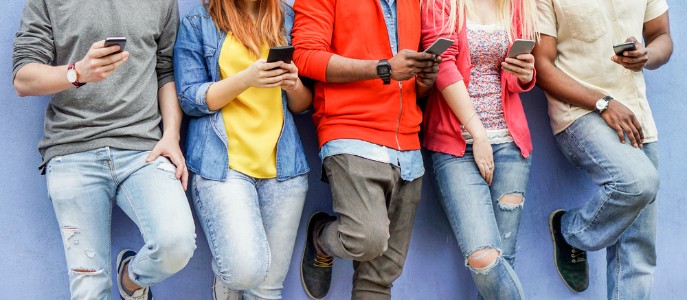Social media has become a fundamental part of our everyday lives. We spend a large part of our days glued to our phones and updating our statuses, sharing our experiences, or simply scrolling through our feeds to find out what our friends are up to. While all this may sound like innocent fun, it has the potential to cause serious problems.
Social media is undeniably a great way to keep in touch with family and friends and stay on top of breaking news, but it’s also responsible for many of the problems of modern life. Addiction, depression, loss of close friendships and insomnia are only a few of the effects it can have on us.
In today’s article, we’re going to look at some of the main problems that social media has brought into our lives. It’s up to us to start using it in moderation.
1. It’s a waste of time
One of the main problems with social media is that it’s a major waste of time. It’s probably happened to you more than once: you’re scrolling through Facebook or Instagram, and before you know it, the entire afternoon has gone by. At first glance, this habit may seem innocuous, but in the long run it can become a serious problem.
Spending too much time on social media can have a negative impact on our lives, starting with our health. Since the rise of social media, many of us have traded taking walks and playing sports for lounging on the sofa and posing.
It not only affects your body, but also puts your mental health at risk. Excessive social media use can throw off your internal clock, causing you to lose your notion of time and even your ability to distinguish between night and day.
Other problems caused by wasting time on social media include difficulty concentrating or performing well at work, and the tendency to neglect one’s real-life friends in order to focus on the online ones.
That’s why it’s so important to limit the amount of time you spend on social media every day. Keep in mind that life is going on around you while you stare at your screen, and you’ll never get back the time you’re wasting.
2. It increases stress
Being addicted to social media can exponentially increase your stress level. Considering how we already live in a high-stress society, this is not something to be taken lightly.
Social media can lead to information addiction and the need to always know what is happening in the world or in the lives of your friends or acquaintances. In the long run, this leads to F.O.M.O. (Fear of Missing Out), a social anxiety disorder stemming from the irrational fear of missing some event and consequently being excluded from your group of friends.
Another major stressor arising from social media networks concerns their messaging services. You’re constantly wondering if the other person received your message, and when they take too long to respond, it can make you anxious and even depressed.
It’s important to know how to limit and manage the information you receive on social media and to avoid thinking of these platforms when you’re not connected to them.
3. It causes low self esteem
On social media, the temptation to compare your life with those of the people you follow can be irresistible. What many users don’t realize is that the lives portrayed on Facebook or Instagram are often not real, but pure fabrications created to attract more followers or to appear to be something one is not.
As the saying goes, comparison is the thief of joy, and when you constantly see your friends partying, flaunting perfect bodies, living in luxury or traveling around the world, you may perceive yourself as inferior to them.
Many social media users live in a constant state of depression due to a sense of inferiority and lack, since they don’t have the same lifestyle that they see everyone else enjoying every day.
Keep in mind that the majority of what you see on social media is just for show. Often, a person on social media who always looks happy and appears to have the perfect job is secretly unhappy and only wants to show the world the life that they wish they were actually leading.
4. It makes you lose your individuality
Social networks have led to the rise of the so-called influencers, a select group of users who, due to their charisma or posts, have amassed millions of followers. Influencers are so popular that major brands use them to promote their products or fashion.
Anything influencers say is applauded by their followers, and they are the ones who decide what is in or out of style. This generates a loss of individuality, because their followers become like sheep, following trends dictated by a handful of people.
5. It generates depression
Although there are countless things that make social media great, it can be an endless source of depression for users. These networks generate a sense of dependency and a constant need for affirmation from other users through “likes” and comments.
Excessive social media users could fall into a deep depression due to a tiny incident such as posting a selfie and not receiving as many “likes” as expected.
Another factor that can impact your mood concerns attacks by trolls or people who amuse themselves by posting hurtful comments online. Social networks have made it much easier to spread hate through groups where these individuals often pop up.
6. It affects your sleep
Excessive social media use is directly linked to insomnia. This is a consequence of other factors we have mentioned, such as stress and depression, which together create a vicious cycle of unhappiness.
It is proven that using any screen before bedtime makes it much harder to fall asleep. What’s more, social media is addictive and hard to stop thinking about even after you go to bed.
It is advisable to use social media in moderation and avoid looking at it before you go to sleep. That’s the only way you can be sure it won’t keep you up all night.
7. It generates arguments and misunderstandings
Social media lets us stay in touch with friends who live thousands of miles away and be close to our family no matter where we are. However, it can also lead to arguments and has the potential to break up even the strongest couples.
A comment on a photo that you dislike, a party you weren’t invited to, a message that was read and never answered… the reasons why people argue on social media are endless. What’s more, since it’s in writing, it’s much easier to misinterpret the tone of a conversation and reach erroneous conclusions.
Since their appearance, social media networks have brought families and friends closer together but have also destroyed stable, long-term relationships.
8. It generates a fear of being different
Social media breaks down the privacy barrier in our lives. They help us to learn things about our coworkers, friends and family members that we otherwise would not know.
Living life your own way, spending your time how you see fit, or thinking in a different way can generate a fear of being different from your loved ones. This leads to confusion, insecurity, and often a fear of not fitting in because you’re too different.
What to do if you feel negatively impacted by social media
As we’ve explained above, social media isn’t just an innocent way to have fun and be connected to the rest of the world. It has many negative effects that we need to know how to mitigate.
If you identify with any of the symptoms we’ve described, we recommend spending a few days away from social media and doing a digital detox. The first few days without being able to check Facebook, upload photos to Instagram or let off steam via Twitter will be hard for you, but in no time at all, you’ll find yourself feeling better. Once you have regained control of your life and time, you can always go back to social media, making sure you use it with moderation.
If you find yourself incapable of spending a single day without it, you probably have a serious social media addiction. In this case, we recommend deleting the apps from your phone and seeking professional help. It may seem like an extreme measure, but in the long run, you’ll realize it was the best decision you could have made.
Do you know of any other negative effects of social media? Tell us about them in the comments section!

The Best Filters for Instagram Stories
READ MORE

